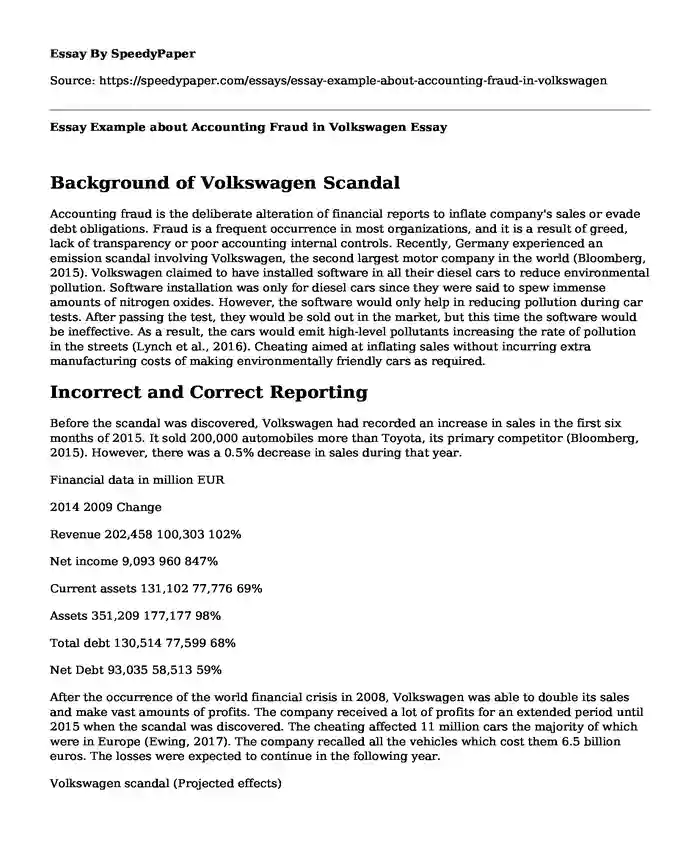
| Type of paper: | Case study |
| Categories: | Volkswagen Accounting |
| Pages: | 3 |
| Wordcount: | 585 words |
Background of Volkswagen Scandal
Accounting fraud is the deliberate alteration of financial reports to inflate company's sales or evade debt obligations. Fraud is a frequent occurrence in most organizations, and it is a result of greed, lack of transparency or poor accounting internal controls. Recently, Germany experienced an emission scandal involving Volkswagen, the second largest motor company in the world (Bloomberg, 2015). Volkswagen claimed to have installed software in all their diesel cars to reduce environmental pollution. Software installation was only for diesel cars since they were said to spew immense amounts of nitrogen oxides. However, the software would only help in reducing pollution during car tests. After passing the test, they would be sold out in the market, but this time the software would be ineffective. As a result, the cars would emit high-level pollutants increasing the rate of pollution in the streets (Lynch et al., 2016). Cheating aimed at inflating sales without incurring extra manufacturing costs of making environmentally friendly cars as required.
Incorrect and Correct Reporting
Before the scandal was discovered, Volkswagen had recorded an increase in sales in the first six months of 2015. It sold 200,000 automobiles more than Toyota, its primary competitor (Bloomberg, 2015). However, there was a 0.5% decrease in sales during that year.
Financial data in million EUR
2014 2009 Change
Revenue 202,458 100,303 102%
Net income 9,093 960 847%
Current assets 131,102 77,776 69%
Assets 351,209 177,177 98%
Total debt 130,514 77,599 68%
Net Debt 93,035 58,513 59%
After the occurrence of the world financial crisis in 2008, Volkswagen was able to double its sales and make vast amounts of profits. The company received a lot of profits for an extended period until 2015 when the scandal was discovered. The cheating affected 11 million cars the majority of which were in Europe (Ewing, 2017). The company recalled all the vehicles which cost them 6.5 billion euros. The losses were expected to continue in the following year.
Volkswagen scandal (Projected effects)
2014 2016 (projected) Change %
Net income 9,093 4,547 -50%
Revenue 202,458 188,286 -7%
D/E 1.45 1.60 10%
Net debt 93,035 102,339 10%
Impact of the Incorrect Reporting
The company would also experience a direct problem by paying a possible fine of 15.8 billion euros. As a result, the company revised its budget and announced a reduction in research and development costs. Besides, the company would convert future development cars to electric cars. While most people were looking forward to the fall Volkswagen due to the scandal, the results would be different. Their idea to shift to the manufacture of electric cars would make them leaders in the motor industry. Therefore, the scandal would only create short-term losses and temporarily destroy its reputation.
Reasoning Used by the Managers to Support the Incorrect Reporting
Managers are likely to adopt cheating due to stiff competition. For instance, Volkswagen and Toyota are the major competitors in the industry, and each of them wants to emerge the best. Thus, they may come up with ways of increasing sales or marketing their products. In the process, they engage in scandals or cheating. The table below shows the income statements of Toyota and Volkswagen.
Potential Private Motivations And/or Incentives for Managers to Adopt the Incorrect Reporting
Ideally, it is evident that competition can lead to scandals. Another motivation of incorrect reporting is greed where a company wants to earn abnormal profits. Companies can eradicate fraud by comparing their performance with similar organizations. In addition, they can conduct regular analysis, cash flow, percentage and ratio analysis, of financial statements.
References
Bloomberg LP. (2015). The long rise and rapid fall of Volkswagen.
Ewing, J. (2017). Faster, higher, farther: The Volkswagen scandal.
Lynch, Luann J., Cutro, Cameron, & Bird, Elizabeth. (2016). The Volkswagen Emissions Scandal. Darden School of Business.
Cite this page
Essay Example about Accounting Fraud in Volkswagen. (2022, Sep 23). Retrieved from https://speedypaper.com/essays/essay-example-about-accounting-fraud-in-volkswagen
Request Removal
If you are the original author of this essay and no longer wish to have it published on the SpeedyPaper website, please click below to request its removal:
- Free Essay Listing Steps to Being a Successful Student
- Free Essay with a Health Care Case Study
- Free Essay Summary of the Book The Prince
- Acculturation and Assimilation - Paper Example
- Free Essay Example on Uses of Psychology in Schools
- Capco's Organizational Structure Case Study
- Consolidated Books of Accounts: Parent Company Responsibility - Paper Example
Popular categories




